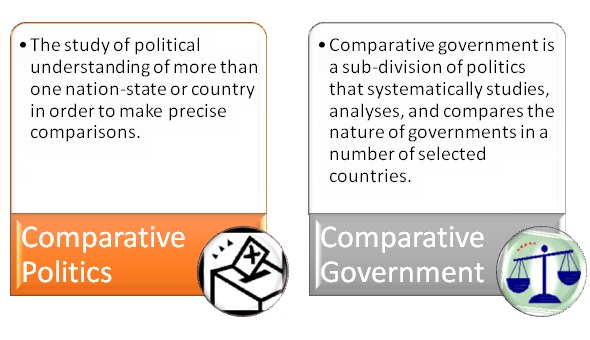Comparative Politics vs Comparative Government
The distinction between comparative politics and comparative government is subtle, and they are often considered as one. The study of political systems across different regions, countries, and divisions has a long history. Politics refers to the practice and theory of governance, organizing control of human communities, and distributing power within and among communities. A political system is a set of practices within a specific political territory. The political system of one country may or may not be different from that of another country or territory. The entity with political power in a particular territory is known as a government. This article delves into the meanings of comparative politics and government, as well as their differences.
What is Comparative Politics?
Comparative politics refers to the study of political understanding across multiple nation-states or countries to make accurate comparisons. It is a widely discussed and studied topic in politics worldwide. Two main approaches to comparative politics exist: the cross-national approach and the area studies approach. The former involves studying numerous nation-states simultaneously to gain a broader understanding of theories and their applications. The latter focuses on an in-depth analysis of politics within a specific political territory, such as a state, country, nation-state, or world region.
What is Comparative Government?
Comparative government is a subfield of politics that systematically studies, analyzes, and compares the nature of governments in various selected countries. A government is the highest governing body in a country or nation-state. By studying comparative government, different forms of governments around the world are examined, analyzed, and compared to understand their differences and identify any potential practices that one country can learn from another and adopt.
What is the difference between Comparative Politics and Comparative Government?
• Comparative politics is a broader field, while comparative government is one of its subdivisions.
• Comparative politics studies and compares various theories and political practices of countries and/or nation-states. In contrast, comparative government focuses on the study, analysis, and comparison of different government systems worldwide.
• Comparative politics encompasses not only government but also the study of political aspects such as governance and foreign policies. On the other hand, comparative government only compares different forms of governmental bodies globally.
Key Takeaways
- Comparative politics is a broader field that includes the study of political understanding across multiple nation-states or countries, while comparative government is a subfield that focuses on the nature of governments in various selected countries.
- Two main approaches to comparative politics are the cross-national approach and the area studies approach, which focus on studying numerous nation-states simultaneously or analyzing politics within a specific political territory, respectively.
- Despite the differences between comparative politics and comparative government, they are often referred to together, and courses in this field typically encompass both topics.
